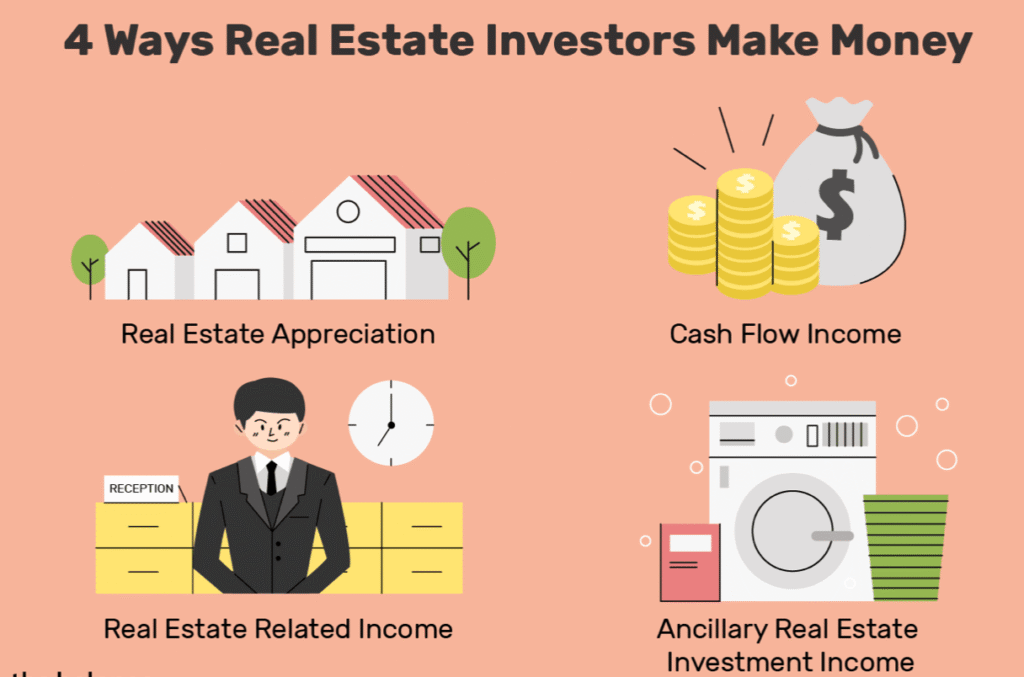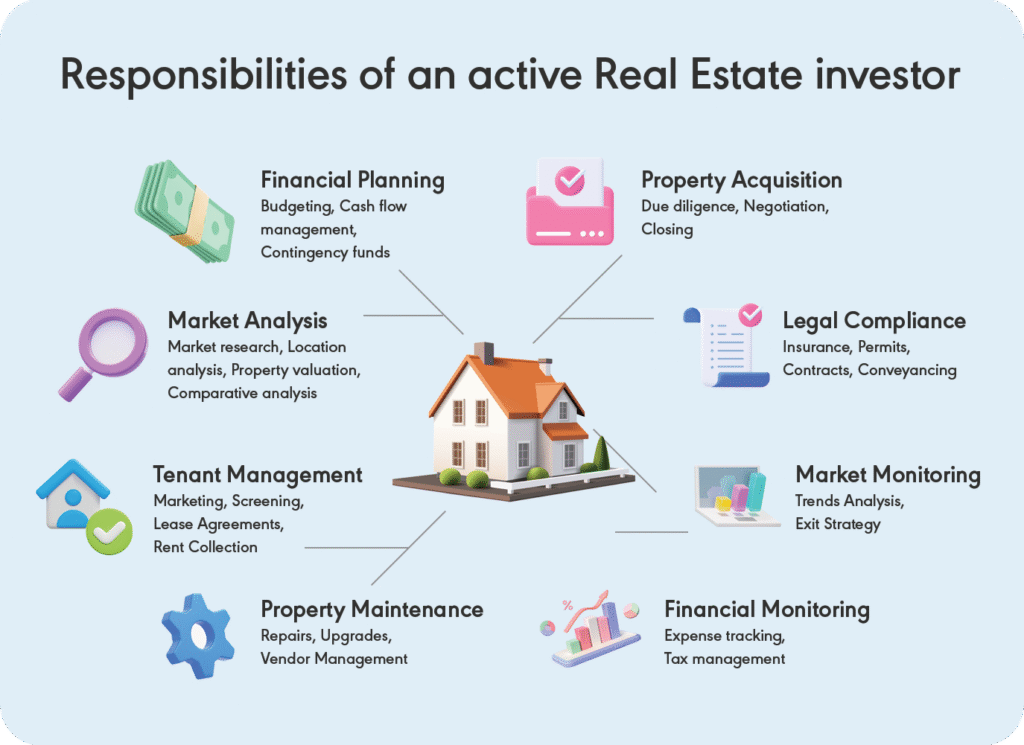Real estate remains one of the most profitable investment sectors in Kenya, offering multiple avenues for income generation and wealth building. Whether you’re a local investor or someone looking from abroad, how to make money in real estate in Kenya can be broken down into clear, actionable strategies.
In this guide, we’ll explore:
- The top ways to earn through property
- Best locations for high returns
- Legal requirements and financing options
- Tips to avoid common mistakes
Why Real Estate Is a Profitable Industry in Kenya
Kenya’s real estate market is booming due to:
- Rapid urbanization and population growth
- Government infrastructure projects (roads, railways, housing schemes)
- Rising middle class with increased purchasing power
- High demand for rental properties in Nairobi, Mombasa, and Kisumu
- Technology-driven platforms making property transactions more transparent
This creates opportunities for both small-scale and large investors to profit through various real estate models.

Top 7 Ways to Make Money in Real Estate in Kenya
Here are the most effective methods used by successful investors:
1. Buy and Sell Property (Flipping)
Purchase undervalued properties, renovate if needed, and resell at a higher price.
✅ Best for: Short-term profits
✅ Location focus: Nairobi satellite towns like Ruiru, Thika, and Machakos
2. Rent Out Residential Properties
Buying apartments or houses and renting them out provides steady passive income.
✅ Best for: Long-term cash flow
✅ Popular areas: Westlands, Kilimani, Mlolongo
3. Invest in Land Banking
Buy undeveloped land in emerging areas and sell when values appreciate.
✅ Best for: Low-maintenance long-term gains
✅ Target zones: Kiserian, Limuru, Athi River
4. Commercial Property Leasing
Office spaces, retail shops, and warehouses offer higher rental yields than residential units.
✅ Best for: Higher returns with longer lease terms
✅ Cities: Nairobi CBD, Mombasa Island
5. Use REITs (Real Estate Investment Trusts)
Invest in professionally managed real estate portfolios without owning physical property.
✅ Best for: Passive income with lower risk
✅ Platforms: Stanlib Fahari I-REIT, Britam REIT Opportunities Fund
6. Develop Affordable Housing Projects
Partner with developers or government programs to build budget homes for growing populations.
✅ Best for: Scalable returns and social impact
✅ Supported by: Affordable Housing Scheme (AHS)
7. Become a Licensed Real Estate Agent or Broker
Earn commission by helping others buy, rent, or sell property — ideal for those who enjoy sales and networking.
✅ Best for: Quick entry with low capital
✅ Required: NLC license and training certification

Step-by-Step Guide to Making Money in Real Estate in Kenya
Follow these steps to begin earning from property investments.
Step 1: Set Clear Financial Goals
Are you investing for:
- Monthly rental income?
- Capital appreciation over 5–10 years?
- Quick resale?
Your goal will determine your strategy and property type.
Step 2: Research the Market
Use platforms like:
- Realestate.co.ke
- Jengo Homes
- Property24 Kenya
Look for areas with rising demand and upcoming infrastructure developments.
Step 3: Choose the Right Location
Top cities and neighborhoods include:
- Nairobi: Karen, Lavington, Westlands, Kilimani
- Mombasa: Nyali, Bamburi, Mtwapa
- Kisumu & Nakuru: Emerging markets with high rental demand
- Satellite Towns: Ruiru, Thika, Machakos
Step 4: Decide on Your Investment Type
| Strategy | Initial Cost | Risk Level | Return Potential |
|---|---|---|---|
| Residential Rentals | Medium | Low | Steady monthly income |
| Land Banking | Low | Low | High long-term value |
| Flipping Houses | Medium-High | Medium | Quick profits |
| Commercial Leasing | High | Medium-High | High ROI over time |
| REIT Investments | Low-Medium | Low | Stable dividends |
| Real Estate Agency | Very Low | Low | Commission-based earnings |
Choose based on your available capital and risk tolerance.
Step 5: Explore Financing Options
How you fund your investment determines how fast and how big you can scale.
Common Methods:
- Personal Savings – Full control with no debt
- Bank Mortgages – Available from Housing Finance Bank, Co-operative Bank, and Jamii Housing
- Crowdfunding – Pool funds with other investors via platforms like Jamii Housing
- Joint Ventures – Partner with friends or family to reduce financial burden
- Affordable Housing Loans – Offered under the government’s AHS program

Step 6: Conduct Due Diligence
Before buying any property, verify:
- Title deed authenticity (Freehold or Leasehold)
- Survey map and boundaries
- Rate clearance certificate
- Encumbrance report (to check for mortgages or disputes)
Always work with a licensed conveyance lawyer to ensure legal compliance.
Step 7: Start Small and Scale Up
Begin with what you can afford:
- Studio flats
- Single rooms in student areas
- Fixer-uppers needing minor upgrades
As you gain experience and generate returns, reinvest in larger deals or commercial assets.
Rental Income vs. Resale Profits – Which Is Better?
Both strategies have merit depending on your goals.
Rental Income Pros:
- Regular monthly income
- Property appreciates over time
- Tax benefits on depreciation and maintenance
Resale/Flipping Pros:
- Quick returns
- Lower management responsibilities
- Can be repeated across multiple properties
Most investors combine both approaches for maximum profitability.
Common Mistakes to Avoid When Making Money in Real Estate
Avoid these costly errors to protect your investment:
❌ Buying without verifying title deeds
❌ Underestimating renovation or legal costs
❌ Skipping professional valuation
❌ Over-leveraging with debt
❌ Ignoring location potential based on hearsay
Always conduct research and consult professionals before committing funds.
Frequently Asked Questions
Can foreigners make money in Kenyan real estate?
Yes, through leasehold ownership, joint ventures, or REITs.
What is the best way to start with little money?
Start with single rooms in student areas, shared housing, or land banking in emerging zones.
Do I need a license to invest in real estate in Kenya?
You only need a license if you’re transacting as an agent or broker.
How much can you earn from real estate in Kenya?
Returns vary:
- Rental yield: 4% – 8% annually
- Flipping: 10% – 30% per deal
- REIT dividends: 5% – 7% annually
Conclusion
Making money in real estate in Kenya is not only possible — it’s accessible to anyone willing to learn, plan carefully, and execute strategically. Whether you choose rentals, flipping, land investment, or indirect options like REITs, the key is consistency, research, and smart use of resources.
With the right approach, real estate can become your primary source of income or a powerful side hustle that builds lasting wealth.
